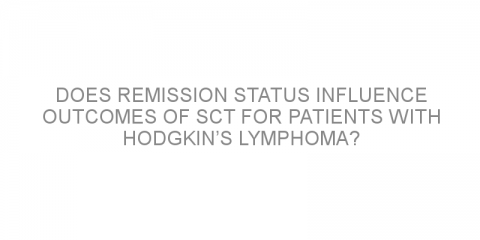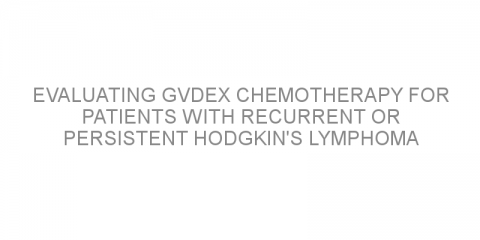In a nutshell This study evaluated long-term treatment with brentuximab vedotin (Adcetris) for patients with Hodgkin's lymphoma (HL) that has come back or stopped responding to treatment. This study concluded that this treatment had a long-term benefit for some patients. Some background Most patients with HL respond well to initial treatment....
Read MoreCurrent treatment status-Undergoing active treatment Posts on Medivizor
Guidelines for the treatment of patients with Hodgkin’s lymphoma
In a nutshell This article outlined recommended treatments for patients with Hodgkin's lymphoma (HL). Some background HL is a type of blood cancer of the lymphatic system. HL can be classified in different ways. In limited HL, cancer is found in one or two sites in the lymphatic system. In advanced HL, cancer is found on both sides of...
Read MoreEvaluating subcutaneous rituximab for patients with non-Hodgkin lymphoma
In a nutshell This study examined whether it is safe to switch from intravenous to subcutaneous rituximab (Rituxan) during first-line treatment of non-Hodgkin's lymphoma (NHL). The authors concluded that subcutaneous rituximab was safe and effective, and improved quality of life for patients. Some background Rituximab is a standard...
Read MoreEvaluating combination CAR-T cell therapy for recurrent or treatment-resistant multiple myeloma
In a nutshell This study evaluated the safety and effectiveness of combining two T-cell therapies for multiple myeloma (MM) that has come back or stopped responding to treatment. This study concluded that this treatment showed promising effectiveness for these patients. Some background Treatment for patients with MM that has come back (relapsed)...
Read MoreDoes remission status influence outcomes of SCT for patients with Hodgkin’s lymphoma?
In a nutshell This study evaluated the outcomes of allogeneic stem cell transplantation (SCT) in patients with classical Hodgkin’s lymphoma (CHL) that was refractory (resistant to treatment) or had relapsed. The study found that patients in complete remission (no signs of cancer) when they received the transplant had better outcomes. Some...
Read MoreLymphoma transformation risk in patients with advanced follicular lymphoma
In a nutshell This study investigated the frequency of lymphoma transformation in patients with advanced-stage follicular lymphoma (FL) after treatment with BR (bendamustine, rituximab). This study concluded these patients might be at risk for lymphoma transformation after initial treatment. Some background FL is the second most common type of...
Read MoreEvaluating pembrolizumab for patients with reoccurring classical Hodgkin’s lymphoma
In a nutshell This study evaluated the safety and effectiveness of pembrolizumab (Keytruda) for patients with classical Hodgkin’s lymphoma (cHL) that came back after initial treatment. This study concluded that pembrolizumab was effective for these patients, with manageable side effects. Some background First-line chemotherapy is highly...
Read MoreEvaluating GVDex chemotherapy for patients with recurrent or persistent Hodgkin’s lymphoma
In a nutshell This study examined if GVDex is as effective and safe as GVDoxil for treating Hodgkin's lymphoma (HL) that has come back or stopped responding to treatment. The authors found that GVDex was as effective as GVDoxil, with fewer side effects. Some background For most patients with HL, primary therapy is highly effective....
Read MoreEvaluating nivolumab plus brentuximab vedotin for patients with relapsed or unresponsive primary mediastinal large B-cell lymphoma
In a nutshell This study evaluated nivolumab (Opdivo) plus brentuximab vedotin (Adcetris) in patients with relapsed or unresponsive primary mediastinal B-cell lymphoma (PMBCL). This study concluded that this combination is promising and was well-tolerated. Some background PMBCL is a rare but aggressive type of non-Hodgkin’s lymphoma (NHL)....
Read MoreComparing outcomes in patients with chronic lymphocytic leukemia with detectable and undetectable minimal residual disease
In a nutshell This study aimed to compare the outcomes for patients with chronic lymphocytic leukemia who achieved detectable and undetectable minimal residual disease (MRD). This study concluded that patients with undetectable MRD had better outcomes than those with detectable MRD. Some background Minimal...
Read MoreEvaluating osimertinib for elderly patients over age 80 with advanced NSCLC
In a nutshell This study evaluated the effectiveness of osimertinib (Tagrisso) in patients over age 80 with advanced small cell lung cancer (NSCLC). This study found that these elderly patients had similar outcomes to patients in clinical trials. Some background NSCLC is the most common type of lung cancer. One common treatment is...
Read MoreEndoPredict – can this prognostic test predict treatment success in breast cancer?
In a nutshell This study investigated if a prognostic tool called EndoPredict can predict the success of treatment in hormone receptor-positive breast cancer (BC). They found that high scores using EndoPredict predicted treatment benefit in patients with BC. Some background Breast cancer (BC) is one of the most common cancers. BC treatment...
Read More












